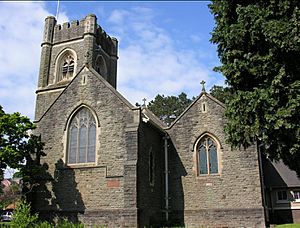Christ Church, Radyr facts for kids
Quick facts for kids Christ Church, Radyr |
|
|---|---|

The church in 2008
|
|
| 51°30′50″N 3°15′05″W / 51.5138°N 3.2513°W | |
| Denomination | Church in Wales |
| Website | https://garthma.wales/our-churches-and-halls/christ-church-radyr/ |
| History | |
| Status | Active |
| Architecture | |
| Functional status | Daughter church |
| Heritage designation | II |
| Designated | 28 October 1975 |
| Architect(s) | G.E. Halliday |
| Style | Perpendicular |
| Groundbreaking | 1903 |
| Completed | May 1904 |
| Specifications | |
| Number of floors | 1 |
| Materials | Pennant sandstone, Bath stone |
| Bells | 8 (1910) |
| Administration | |
| Parish | Radyr |
| Deanery | Radyr |
| Archdeaconry | Llandaff |
| Diocese | Diocese of Llandaff |
Christ Church is an important church located in Radyr, a town in Cardiff, Wales. It is part of the Church in Wales. Even though it is quite large, it is considered a "daughter church" of St John the Baptist Church, Danescourt. This means it is a newer church that grew out of an older, main church.
Contents
Building Christ Church
Why the Church Was Built
The idea for Christ Church started in 1903. At that time, the towns of Radyr and Morganstown were growing quickly. More people meant there was a need for a new church building.
Who Designed and Built It
The church was designed by G.E. Halliday. He was the main architect for the Diocese of Llandaff, which is a church area. The first part of the church, called the nave (the main area where people sit), was ready for use on Easter Sunday in 1904.
Important People Involved
The land for the church was given by Robert Windsor-Clive, 1st Earl of Plymouth. He was a very important person who lived nearby at St Fagans. He had also been the mayor of Cardiff in the 1890s. He helped lay the special dedication stone for the church.
How the Church Grew Over Time
The church wasn't built all at once. In 1910, more parts were added. These included the chancel (the area near the altar), the vestry (a room for clergy), and the tower. Later, in the late 20th century, an extension was built. This new part added rooms for church activities and meetings. The original vestry is now used as a small chapel.
 | Bayard Rustin |
 | Jeannette Carter |
 | Jeremiah A. Brown |

